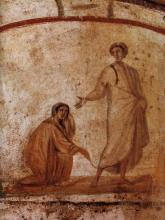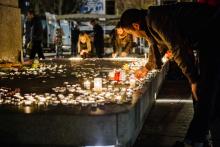Bible Study

The presidential race has invited all kinds of rash predictions. “If that candidate gets elected, it will be a disaster.” “If that candidate is president, I will move to Canada.” In each case, the prediction of a future disaster is supposed to convince us to act differently in the present. “The election of a certain candidate would be so awful, that we must stop it. Or I’ll move to Canada.” Key parts of our political discourse are predictions of a dire future if a certain candidate is elected.

Recently, a friend emailed me that their twenty-three-year-old son had attempted suicide. The young man had been found fairly quickly, but due to the nature of his attempt and his severe depression, he is now in a hospital's psychiatric ward. My friend asked, “How did it get so bad and I didn't know?” She is trying to process guilt and anxiety about what might have happened. Her son is getting the help he needs, but it’s a long journey back to health and wholeness for the entire family.

Sometimes there are no advocates, no allies, no other choices but to be the one to take a risk with no guarantee or promise of success, of justice, of healing.

The story of Jesus’ passion and death has stirred my imagination since I was a child. In an act of profound mystery, Jesus walks towards the conflict swirling around him. Jesus accepts his arrest and does not raise his voice. His willingness to embrace the consequences of truth-telling leaves him silent in the face of his accusers. His judges repeatedly say they can find no fault in this man, but the people want more. They want someone to blame.

There is a story in our family lore that during a contentious presidential campaign a few decades ago my father refused to drive his mother, my grandmother, to the polling station on election day. She was voting for the opposing candidate and he didn’t want her to cancel out his vote. Though contentious at the time, it is a story that still evokes laughter in our family each time it is retold. And don’t worry — grandma eventually got a friend to drive her to the polls.

In this season of Lent, Isaiah 55:1-9 may be a sobering text for us. In this election season amid shrill or buoyant rhetoric, we may not notice that there are real choices to be made — even as Jews in ancient Babylon were confronted with real choices of a most elemental kind.

My wife and I are beginning to start the process of buying a house for the first time. For better or for worse, we have become regular viewers of HGTV’s line of television shows that target would-be home consumers just like us. There’s Fixer Upper, Flip or Flop, Property Brothers, Love It or List It, and…boy, could I go on. On the one hand these shows give us an interesting entree into what’s possible when it comes to buying and renovating a house. They may expand our vision so we don’t get stuck on things like existing wallpaper, old carpet, or hideous paint color. But, as I’ve come to understand the (very predictable) arc of these shows, I’m also struck by their danger. They’re basically “Keeping Up with the Joneses” on steroids.

I must confess that I am an African-American woman, a Christian woman, a woman who believes there is more than one path to God. Working in the Black Lives Matter movement with people of many faiths, I get a little fidgety when I hear the words “confess that Jesus is Lord and believe that God raised him from the dead.” I think, “Hey, what about my Jewish friend Stef? She is not confessing the Lord-ship of Yeshua/Jesus. What about my friend Hussein? Is he not saved?” I just don’t like it.

The gospel account of the transfiguration of Jesus comes at a time when we desperately need its powerful message of encouragement. Our nation is in the midst of an epidemic of what I call “a degenerative discouragement syndrome”. The news cycle enumerates a list of issues and concerns which seem to resist remediation or repair.

AN UNUSUAL TITLE recently caught my eye at the library. The book is called The Moral Molecule: How Trust Works, by Paul J. Zak. An economist with obvious interests in biology, psychology, and religion, Zak’s numerous experiments demonstrate that when someone is shown a sign of trust or when one’s empathy is engaged, a certain molecule called oxytocin surges in the brain and blood.
“When oxytocin surges,” says Zak, “people behave in ways that are kinder, more generous, more cooperative, and more caring.” In other words, they follow the Golden Rule of treating others as you want to be treated. Zak eventually demonstrates how oxytocin can work within economic systems, which reminded me of a children’s song we sang at a church I used to attend in Chicago: “Love is like a magic penny. Hold it tight and you won’t have any. Lend it, spend it, and you’ll have so many they’ll fall all over the floor!”
And that reminded me of research I had done on the early Jerusalem church in the book of Acts. If there ever were oxytocin surges, it must have been at Pentecost and in the days and years of the shared economic community that followed!
Two summary texts describe the common life shared among these earliest believers: Acts 2:44-47 and 4:32-37. The first tells of their daily life together, distributing possessions, worshiping in the temple, and eating a daily communal meal in various households. The second passage describes the renunciation of private ownership. Believers sold their land and homes and gave the money to the community to be distributed “as any had need” (4:35).
Why did they do this? Wasn’t it impractical and more trouble than it was worth? Didn’t they soon have to cope with cheaters like Ananias and Sapphira (5:1-11) or complaints from Hellenist widows (6:1-6)? Didn’t that radical idealism soon peter out and people go back to their former lifestyles?
Interpreting through middle-class mirrors
My research on how these economic texts have been interpreted throughout Christian history was eye-opening. Ever since market capitalism arose in the 14th century, many commentators considered the communalism of the Jerusalem church to be unrealistic. For example, John Calvin, a 16th century community organizer, writes in his Acts commentary that he had to “properly” interpret communal sharing in 2:44 “on account of fanatical spirits who devise a koinonia of goods where all civil order is overturned.” He especially criticizes the Anabaptists of the time, because “they thought there was no church unless all mens’ (sic) goods were heaped up together, and everyone took therefrom as they chose.” Instead, Calvin recommends that “common sharing ... must be held in check.”
The rise of historical criticism during the 19th century in the West led to much skepticism about the accuracy of biblical texts. Luke wrote decades later, scholars asserted, idealizing the early church in Acts. The Jerusalem believers were very poor and had to help each other out, so Luke turns this grim picture into a Golden Age of sharing. In his 1854 commentary, Edward Zeller maintained that Acts 1 to 7 was full of legends and fictitious stories that Luke himself created.
The conservative reaction to such skepticism was to affirm the historicity of the early chapters of Acts—but to see this as a socialist experiment that soon failed and was never tried again. Its failure was confirmed by the poverty of the Jerusalem church in Acts 11:27-29, where the disciples at Antioch decided to “send relief to the believers living in Judea.”
No doubt these notions about the community of goods in Acts 2 to 6 prevail in many churches today. But both perspectives get it wrong because scholars and laypersons alike read these texts out of their own economic situation—Western capitalism. For middle and upper-middle classes (from which most biblical scholars emerge), capitalism has worked well. As a political and economic system, it has staunchly opposed Marxist and other ideas of socialist communalism, often perceived as “godless.”
This hostility has made it almost impossible to view the socialism of the early Jerusalem church as a positive development or one that survived more than a few years. For example, G.T. Stokes’ 1903 Acts commentary in the English Expositor’s Bible series declared that the Jerusalem experiment was a socio-economic disaster that should never have happened. One of the evils it produced, according to Stokes, was the conflict between the Hellenist and Hebrew widows in Acts 6:1. Stokes assumes they were destitute widows fighting over poor relief. Reflecting Victorian class distinctions and paternalistic attitudes, he asserts, “No classes are more suspicious and more quarrelsome than those who are in receipt of such assistance ... Managers of almshouses, asylums, and workhouses know this ... and ofttimes make bitter acquaintance with that evil spirit which burst forth even in the mother church of Jerusalem.”

There is so much arguing over boundaries. Should we welcome refugees from Syria, a nation torn by civil war and terrorism? How should our society respond to others who have immigrated here without government approval? Although immigration from our southern border has declined over the past decade, some public leaders applaud the contributions of undocumented Americans while others spell out the risks they bring. Do we consider immigrants likely contributors or potential criminals? When activists proclaim “Black Lives Matter,” the counter-point “All Lives Matter” looks like an attempt to hush a legitimate complaint about policing and criminal justice. I catch myself needing some of those noise-canceling headphones.

On Dec. 28, just before New Year’s Day, a Cleveland grand jury declined to indict the officers who killed Tamir Rice, a 12-year-old boy who had been playing with a toy gun in a park near his home. For many, the news resounded as yet one more tragic refrain in the long litany of our nation’s utter disregard for Black lives. Extinguished in the innocence of childhood, without even a second thought.

The activities of the Christian community should be no less vigorous as we enter the mid-month point in January 2016 and the energy of the Christmas season has passed. In fact, it is on this second Sunday after Epiphany (the Christian feast day and season known as “manifestation”) that an honest evaluation of our situation locally, regionally, and abroad should be made.

You’ll always find what you’re looking for. Unless, of course, you’re Mary and Joseph, looking for your preteen son on your road trip home from the Passover festival in Jerusalem.
This is the scene found in Luke 2:41-52, the Gospel reading for the final Sunday of 2015. Mary, Joseph, and Jesus joined other travelers on their annual pilgrimage. At the end of the festival they begin their trek home. Mary and Joseph assume Jesus is behaving like a typical preteen, avoiding his parents and traveling with other friends and relatives. But after three days of searching for their twelve-year-old son, Mary and Joseph find him back in Jerusalem, talking with the teachers at the temple.
This is a story about searching for Jesus. This is a story about finding what you’re looking for.

National Geographic magazine recently named Mary, the mother of Jesus, “the most powerful woman in the world” as an appraisal of her ongoing influence and popularity. But do Mary’s words and example have a prayer of being heard and effecting change in this time of war?
Indeed, this is war. America has effectively been engaged in continuous warfare since the weeks after September 11, 2001. In a few decades we’ll learn what happens when whole generations of people grow up and take charge of a society that has waged war their entire lives.
Attempts to tone down the descriptions we use for warfare or the way we conceptualize the present conflict don’t change anything. No end is in sight. Others turn up the rhetoric: after the San Bernardino shooting, at least one presidential candidate insisted the USA now finds itself in “the next world war.” Another one puffed up his chest and boasted of his resolve to “carpet bomb” people. We hear this stuff so often, we’ve become numb to its magnitude.

The intellectual in exile is someone who completely removes him or herself from a society, culture, belief, or way of thinking in order to fully examine it. Said says that exile is the only complete way to get an understanding of how something runs.
As long as you are a part of the machine, in other words, you are blind to some of its constructive, and destructive, features.
The intellectual in exile does not need to remove him or herself from a popular city. You can be an intellectual in exile in any major cities around the country. What’s required instead is to remove yourself from your typical thought process. Challenge things.
The intellectual in exile is happy being uncomfortable. This constant struggle encourages them to constantly develop, and not ever settle for what is easy or popular.
Yet it is still important to keep yourself in good community. Said also said, “No one is totally self-supporting, not even the greatest of free spirits.”

“All flesh shall see the salvation of God” (Luke 3:1-6). Well, that depends.
It depends on where you are from. It depends on your country of origin. It depends on your religion. It depends on with whom you are associated. It depends on your race, your ethnicity, your gender, your sexual orientation. The list of criteria for salvation, contrived predominantly from our many fears, is long according to the world as we know it today, but not according to the Gospel of Luke. And since Luke is providing a particular portrait of Jesus, not according to Jesus either.
This passage from Luke for the Second Sunday of Advent points to competing worldviews. The opening verses are deceptively subversive. Into the religious reigns and imperial kingdoms of the first century C.E., the word of God comes. Emperor Tiberius, Pontius Pilate, Herod, Philip, Annas, and Caiaphas will have to tend with the rule of the word of God, a rule that insists on salvation for all.

It is so easy to read Mark and think of war as far off — especially if you are someone living in a neighborhood or region that has a semblance of peaceful times. For non-military families and organizations it is easy to miss that “wars and rumors of wars” means that families, perhaps right next door to us, are bracing for the possibility that parents or children may be leaving soon.
The portion of our population in the military is staggering. According to 2013 reports, approximately 2,220,412 of our population were on active duty in the armed forces and reserves. Family members out-numbered military personnel 1.4 to 1. There were 689,344 spouses reported and more than 1.2 million dependent children living in active duty families.

As the political stage gets set for the 2016 U.S. presidential election, how should Christians engage?
One unexpectedly relevant guide can be found in the book of Judges, which more than any other book in the Bible, describes a divinely-inspired form of leadership similar to our own. Between the era in which God spoke through Moses, and the one in which God worked through kings like David, came an era — lasting over four centuries — during which God raised up a series of individuals who had no predefined lineage, accomplishment, or gender marking them as leadership material. These judges were not judicial so much as military leaders, fulfilling a role strikingly similar to that of the American president.
Another notable commonality Americans share with the Israelites of Judges is the crisis in which we find ourselves. Apostasy, from the Greek word apostasia, means “an abandonment of one’s previous faith.” Then as now, a nation was turning away from God.

MY FAMILY EMIGRATED from South Korea to Canada in 1975 when my sister and I were 6 and 5 years old, respectively. Before I left Korea, I had no idea where Canada was. With our mother, we boarded a plane that took us to Hawaii, then Alaska, and finally Toronto.
Korean was the only language I had ever spoken. I assumed that everyone spoke Korean. I had no idea what people were saying when I arrived in Toronto. My uncle in Korea gave my sister and me each a cute little necklace to wear with our name, address, and phone number written on the back of it. It was a round red necklace with a picture of an adorable puppy. We wore it around our necks on the plane so that if we got lost, we could more easily ask for help to find our way home.
After 40 years of carrying the necklace with me as I moved from place to place, my children threw it into the garbage last year as they were doing spring cleaning. They thought it was a piece of junk. It may look like junk, but to me it provides a special reminder of my childhood, family, and the home from which I emigrated. Luckily, I liberated it from the garbage before trash day. Now I keep it safe as one of my prized possessions, one of the few things I have left from Korea and from my childhood.
My necklace reminds me from where I have come, what I have experienced, and what I have endured. As my necklace has survived all the moving and tossing around in my life, I too will survive.
As an immigrant family, we had few earthly possessions. We lived in a two-bedroom, cockroach-infested apartment. I had only one little hand-me-down toy doll that someone passed on to me rather than throwing into the trash. My library consisted of a few books that I read over and over. My parents had one car, and they worked different shifts, so they were rarely home at the same time. There was no car at home to drive us to the library to sign out books. After awhile I allowed my creativity to run wild and made up imaginary stories based on the pictures in the few books we had.